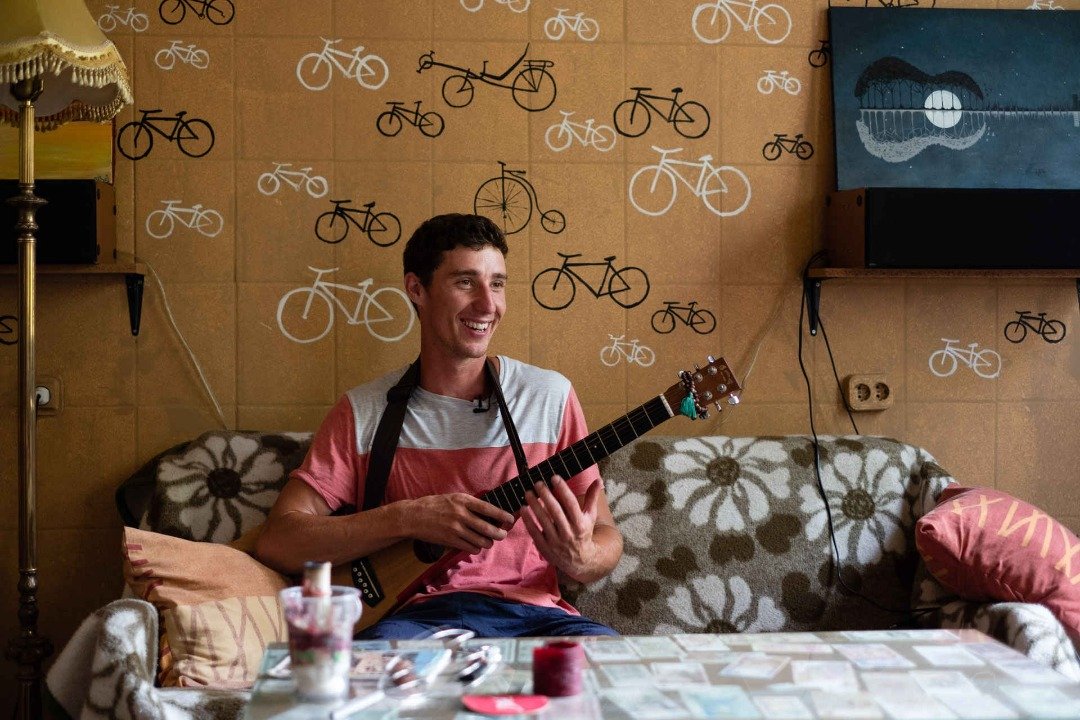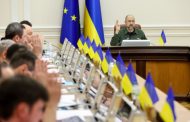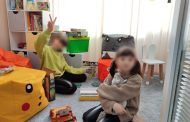Three friends from the small town of Sosnivka on the border of Volyn and Halychyna founded a “dream fund” a few years ago. It all started with an acquaintance with Ivan Maslyuk – a guy who lives with cerebral palsy (CP) and cannot move on their own. Together, friends planned a bicycle trip around Europe to fulfill Ivan’s dream – to see Lisbon. And after returning from a trip to Ukraine for more than three months, they created the public organization On3Wheels. Together, they open up the world to people with disabilities through volunteers and special bicycles.
With founders of On3Wheels – Oleg Savchuk, Sashko Lutsyk and Anton Som. It was from them that the initiative began, which has already received widespread support among people who are not indifferent to people with disabilities.
One day in the village of Berezivka near Radekhiv, Galicia, Oleg saw Ivan at a disco. That’s why he was 19 then and he never left Lviv unaccompanied:
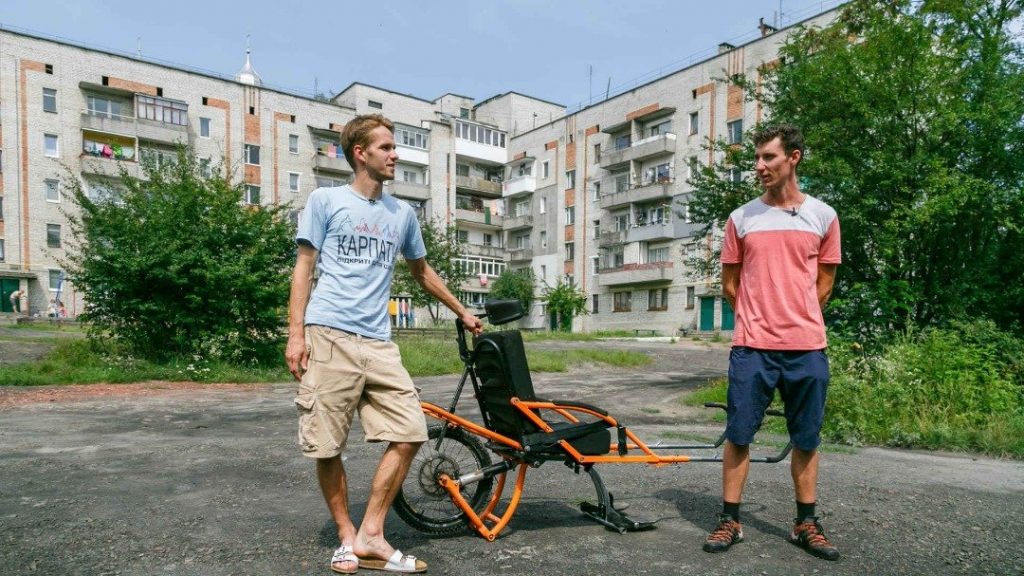
- At that time I was already a lot of places. And then I saw a guy in a wheelchair leaning on a stilt and dancing. In parallel to him, who is there and what is looking. I wondered what kind of guy is not ashamed of his disability. I approached, met – and so we became friends.
Ivan had a dream: he wanted to see the ocean, but only if he got there himself. At first he wanted to go horseback riding, because at that time he was engaged in horseback riding. But during a trip to Iran (where he lived on the island for seven months and ran his newly established restaurant), Oleg saw a tricycle (“tricycle” or handbike), which could be useful to Ivan.
The location of the wheels of the tricycle resembles a stroller (two wheels at the back and one at the front), so it is quite stable. Control the tricycle with your hands. The helmsman seems to be lying in a plastic hammock, fixing his legs on a special stand (where the pedals are usually located), and twisting the modified pedals with his hands. They are moved to the steering wheel and perform two functions: control the direction of movement and help to gain speed.
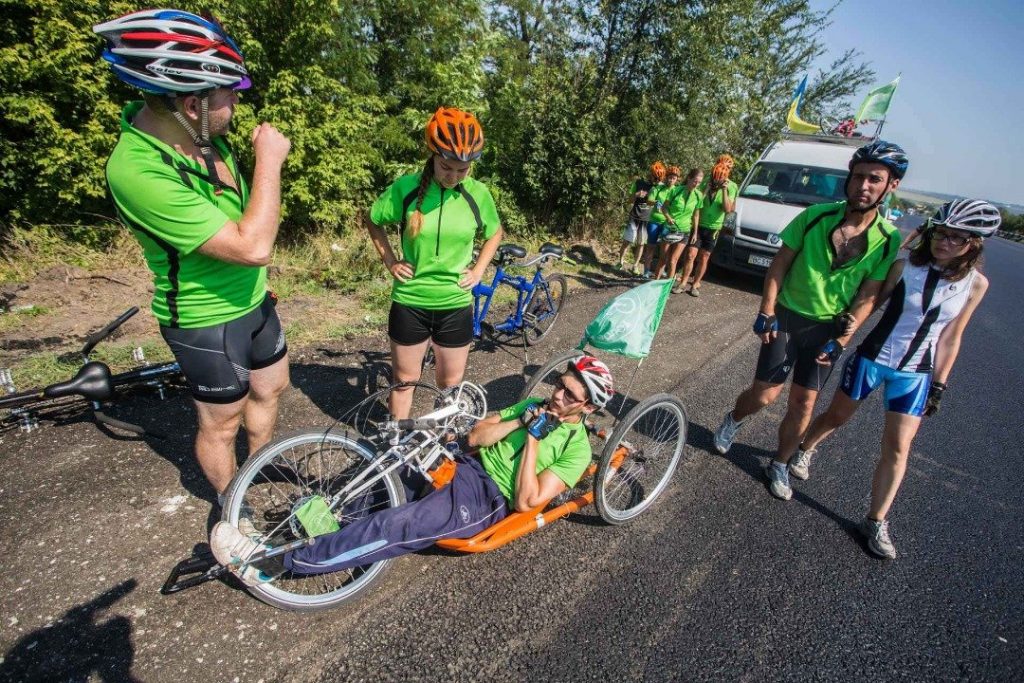
This design makes the tricycle quite stable. So do not worry that a person may lose his balance, as is often the case with a two-wheeled bicycle. However, Ivan fell from it several times.
So the friends decided to go together. They spent three months preparing for a trip to Lisbon. That’s where Oleg offered to go: there is the Atlantic Ocean, go there for 100 days, you need to travel 12 countries and cover 5,000 kilometers. Friends set aside $ 300 for the trip, found sponsors and launched a campaign on social networks – they told about a new experience for Ukraine. During this time, hundreds of people learned about their route, who supported Ivan and his friends morally and financially.
Despite the fact that Ivan could not move independently due to cerebral palsy, he covered thousands of kilometers and reached the ocean. He usually begins his story of the journey with the words:
-You know, I’m a happy person. My dreams come true.
Hiking in the mountains
Inclusive tourism as a phenomenon is most common in the United States and Europe. In Ukraine, it is still popularized by some initiatives. . The essence of such tourism is the accessibility of tourist places for people with disabilities. It is both a transfer and a universal design, ie comfortable for anyone.
During the trip, the boys saw in France a strange means of transportation: a wheelchair inside a metal structure with long handles at the front and rear. It was La Joelette, or “julette”. Named after the founder Joel Claudel, this “bike” was created for a boy from France, whose disease progressed and made it impossible to hike in the mountains with his parents.
The veil is used to help people with disabilities move anywhere: in the mountains, during marathons or regular walks in nature. Wheelchairs are not as mobile: sometimes it is difficult to overcome ordinary stairs. The vest has a different design.
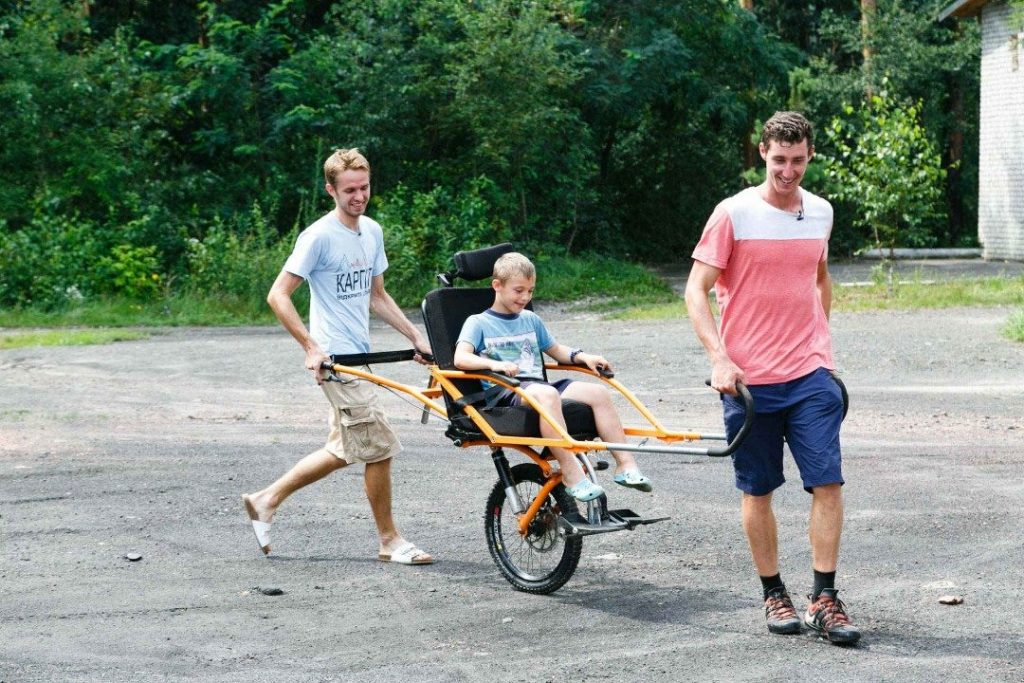
The man sits down in a chair, and at least two people grab the handles and pull – push the vest in the right direction. In this case, the only point of contact of the julietne to the ground – the wheel under the chair, making it easier to control.
In France, Ivan and his friends were invited to visit Handi Cap Evasion, a social service that helps people with disabilities conquer mountain peaks using a rosary. The boys recalled their attempts to climb Mount Gimbu (Gembu). Then in Volovets Ivan was put on a two-wheeled bicycle and pushed up to the top. During the first ascent, friends met on the route of Odessa. Oleg remembers:
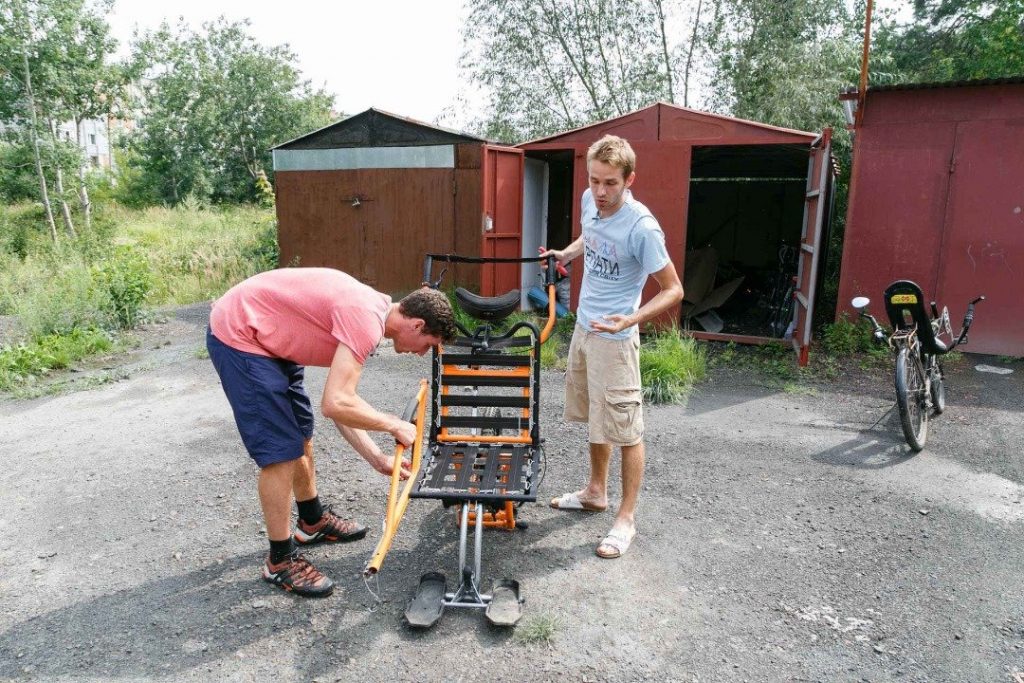
- They look at that big one and say: “Do you have this bike? Where are you dragging him in the mountains? But you won’t go there by bike. ” They didn’t even understand that we were going to drag Ivan now. But we pulled out.
When the boys got tired, Ivan braked. It was difficult for everyone, because a two-wheeled bicycle is unstable. Sasha smiles and remembers the end of the climb: - The first time we saw a person with a disability in the mountains and his reaction. And decided to help. Well, because these emotions are impossible to forget and convey. So why not start such a movement in Ukraine to take people with disabilities to the mountains, yes?
Friends received the only rosary in Ukraine as a gift from the STB TV channel in the program “Surprise, surprise!”. The boys had already tested this vehicle on Ivan when they were in France, and having obtained their own gulet, they went up to Hoverla with him.
Now the juliet is in great demand. Almost every week On3Wheels organizes climbing at its own expense for everyone or lends it to those who would like to go there with friends, not with volunteers.
One rogue is not enough
Isolation, in which people with disabilities still live in some places, is a sad Soviet legacy. Inaccessibility or lack of opportunities for development minimized ties with the world. Such people mostly stayed at home or lived in special boarding schools.
Not surprisingly, Sasha never talked to people with disabilities before he met Ivan. But over the last few years, society’s consciousness has changed and attention to people with disabilities has grown.
Now various public organizations – “Feel”, “See with the heart”, “Available.YUA”, “Active Rehabilitation Group” and others – are beginning to create conditions for each and everyone, so that a person with any disorder can move and communicate freely. Wheelchair ramps, visual aids for people with visual impairments, subtitling and sign language for people with hearing impairments, workshops for people with mental disabilities – that is gradually becoming the norm in Ukraine.
-Well, I knew that they (people with disabilities – bus. ) Exist somewhere there, sometimes they go, but yes, to communicate with them, to experience their experiences or problems there – no, there was no such thing. Ivan and I spent a hundred days.
The On3Wheels project started after meeting Ivan and exclusively thanks to him. The argument “because I have such a friend” works because it testifies to the sincerity of intentions and the authenticity of friendship. The next step in accepting a situation is understanding that you have more in common than different.
Yes, people with disabilities can’t climb to the top of a mountain on their own, but that’s one of the few differences. Oleg mentions his “insight”.
-Well, we realized that he has the same needs, he also laughs… They have the same habits, the same things they do, so do we, so there is nothing like that.
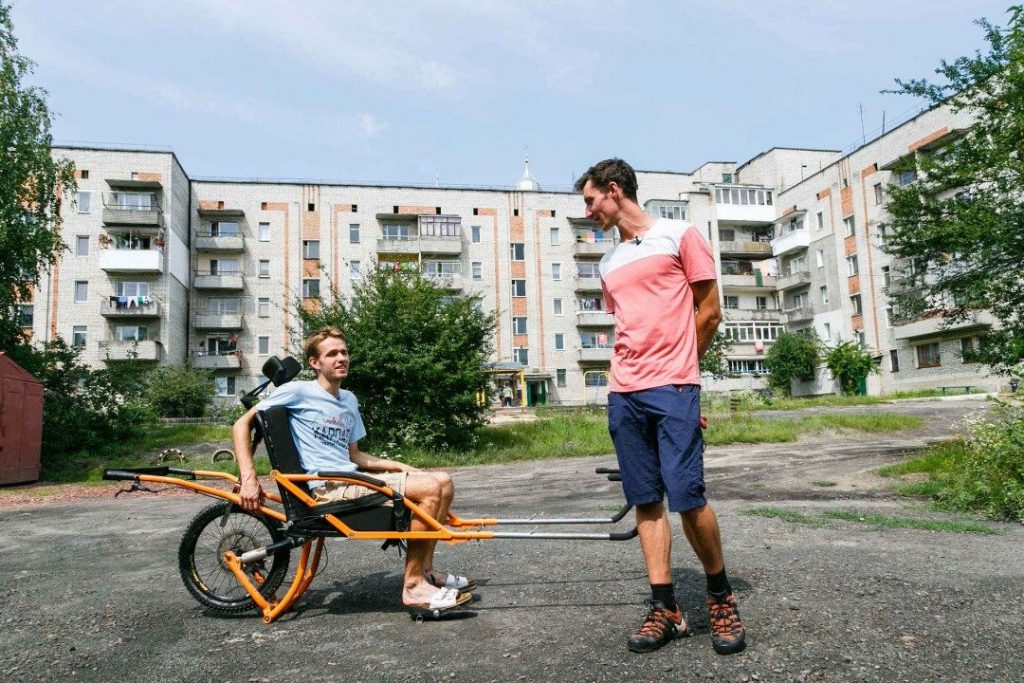
-In France, the Juliet appeared in 1997, in Ukraine almost 20 years later. The first is now operated by the guys from On3Wheels. And two years ago, thanks to crowdfunding, they raised funds for the production of the second, which should be ready soon.
The guys insist that this is not enough for the whole of Ukraine. However, this is a good start for a long marathon.
The On3Wheels project seeks to change society’s attitude towards people with disabilities. However, the fact is that any change requires the desire and involvement of both parties. Juliet is a symbolic embodiment of this: a person with a disability is ready for something new – challenges or overcoming difficulties, and her friends or volunteers are ready to make an effort and help overcome obstacles.
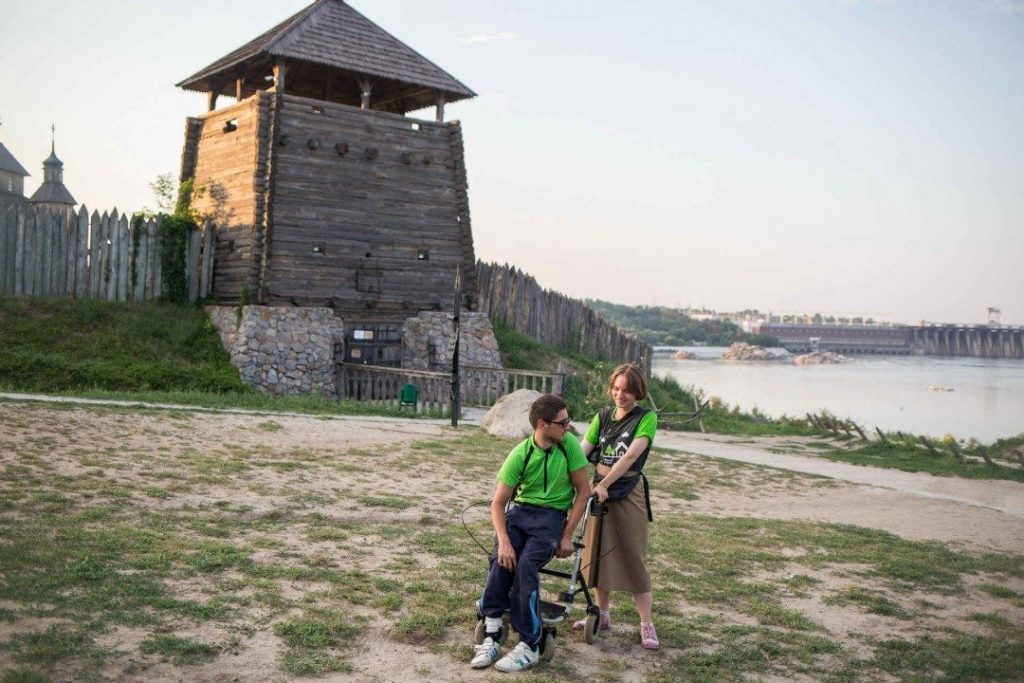
Sashko and Oleg say that the project is aimed more at healthy people than at people with disabilities – so that they understand that these people can live the same way, they just need the involvement and help of others. Therefore, this project changes everyone:
-After our campaigns, people do not remain as they were. That is, first, those who have some experience with people with disabilities for the first time, so squirm, approach from afar, and then calmly talk to them in “you”. You somehow also go on a hike with us, if possible.


